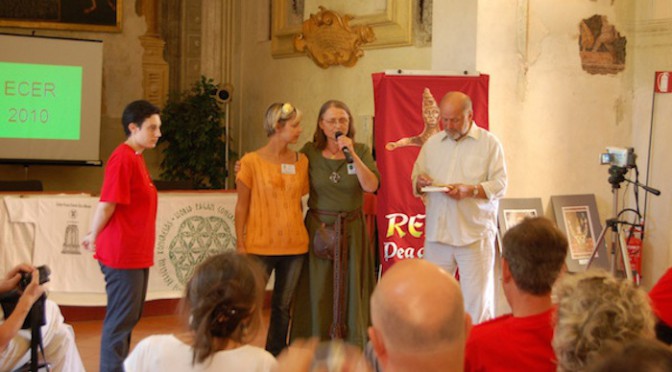Dear friends,
Greetings to all participants of the WCER conference. I would like to remind you that our organization, born in 1998, this year will be gathering for the 13th time. I am very pleased that we have been so graciously invited to the city of Bologna in Italy. Bologna is a historically important Renaissance city, so Gentilitas is choosing the location where the Congress will take place according to the needs of the foreign Delegations. We are very grateful to the religious association Gentilitas – Spiritualita Italica, who put a lot of effort so that delegates from different countries could gather to socialize and discuss.
The ancient religious and cultural traditions are being reborn, and at this time there are quite a few such movements. They are very varied and not always are based on humanist and democratic values. However, the WCER Declaration protects us from any mistakes or distractions. I invite all participants of the conference to read again the Declaration. I will remind you of a few parts from the Declaration: “Our sincere wish to live in peace and harmony, and to strive for cooperation with the followers of all other religions, faiths and beliefs. The WCER is categorically opposed to discrimination, suppression based on race, colour, social class, religion and national origin.”
Italy has preserved the perfect traditions of antiquity, as well as the wisdom of the philosophers. The words of the great philosopher, Emperor Marcus Aurelius, are very important for us: we are first of all Humans, after we are Europeans, and then Italics. I would also like to remind you of the regulations of Gentitas – Spiritualita Italica: “Our Association fights every day against any kind of discrimination, racism, political ideologisms. We are totally against this approach and the contamination of our religious tradition with modern politics.”
The European Union (EU) presently exists as a union of independent countries based on economical and political factors, but there are also voices being raised about cultural and religious unity. In fact, all European countries were traditionally connected into political and religious units. The roots of most European nations are Indo-European and national state separation is the result of later political and religious processes. European Ugro-finns and nations of other origins are not that different from Indo-Europeans. The splitting of the countries’ national identities was partly initiated by new religions – Christianity, Islam etc. The saddest recent example is Yugoslavia, where the break-up of the country turned into a religious war and the purging of ethnic minorities brought international condemnation.
Limiting Europe with the Christian tradition would mean its eventual spiritual depletion. Even Christianity itself is formed from the riches of antique Greek culture. It should also be remembered that Christianity, instead of carrying forward religious tolerance, was more destructive towards European cultural tradition and religion. Let us not forget that the Crusades were also fought in European territories and many countries suffered severe tragic losses.
When discussing European traditions it is not enough to limit the discussion to the antiquities of Greece and Rome. One should bear in mind the Celtic, Slavic, Baltic and Germanic civilizations and their rich cultural heritage. This heritage has not completely disappeared and can still be found in various forms. At present almost all mentioned nations and cultures are undergoing a renaissance, revival of an old and often forgotten Europe.
In 1998 the World Congress of Ethnic Religions (WCER) was founded in Vilnius, Lithuania. Representatives of 13 European ethnic religions took part in it, as well as several representatives from India and USA. The vision of the founders of WCER was to unite movements of world’s ethnic religions. During the first conference there were discussions as to how the congress should be called. The various names offered were: pagan, indigenous, native, traditions, or ethnic religions. Most participants chose the term “ethnic.” It later turned out that the Parliament of World Religions uses the term “indigenous.”
During the following years, another 10 European ethnic religious organizations joined the WCER, demonstrating that we have truly created a European organization. This process has run parallel to the expansion of the European Union in further connecting our European nations. These events encouraged us to make a decision and announce that WCER is being reorganized into European Congress of Ethnic Religions (ECER).
In 2009 Romuva (the association of Lithuanian traditional religion) was invited to The Parliament of World’s Religions that was held in Melbourne, Australia. Romuva was invited to take part and was an active participant in the section of the Association of Indigenous Religions. During the religious congress I presented not only Romuva’s, but also WCER’s activities. This invaluable experience of taking part in the Parliament of World’s Religions after ten years of being part of the WCER encouraged me to review and define the vision and area of our activities.
That’s why I wish to evaluate and redefine the term we use to identify ourselves. I am referring to WCER – World Congress of Ethnic Religions. There is a term that I suggest should be discussed: change of “world” to “European.” Therefore the title of the association would be changed to ECER – European Congress of Ethnic Religions.
Most of us are Indo-Europeans, so as we become a congress of European religious indigenous organizations, we shouldn’t forget our great religious brothers, the Hindus. For years the WCER has been supported by ICCS USA, who regularly invite us to their conferences in India. Now they will take part in our conference in Bologna. ICCS USA are also co-sponsors of this conference.
Jonas Trinkūnas
President of the WCER
